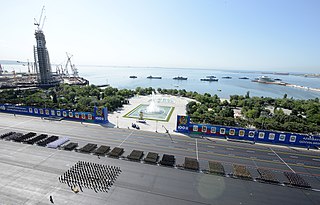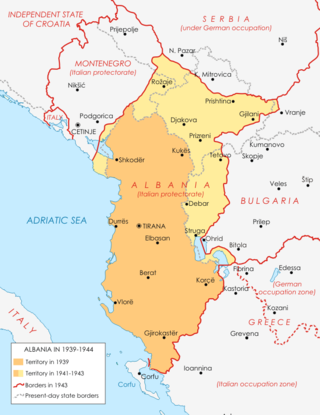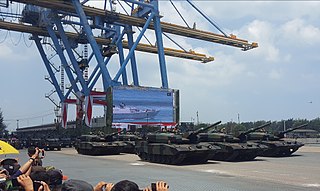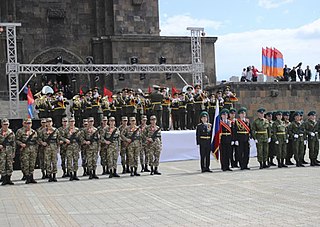Related Research Articles

Nnamdi Benjamin AzikiwePC, usually referred to as Zik, was a Nigerian politician, statesman, and revolutionary leader who served as the 3rd and first black governor-general of Nigeria from 1960 to 1963 and the first president of Nigeria during the First Nigerian Republic (1963–1966). He was widely regarded as the father of Nigerian nationalism as the driving force behind the nation's independence in 1960.

Victory Day is a holiday that commemorates the Soviet Union victory over Nazi Germany in 1945. It was first inaugurated in the 15 republics of the Soviet Union following the signing of the German Instrument of Surrender late in the evening on 8 May 1945. The Soviet government announced the victory early on 9 May after the signing ceremony in Berlin. Although the official inauguration occurred in 1945, the holiday became a non-labor day only in 1965.

A military parade is a formation of soldiers whose movement is restricted by close-order manoeuvering known as drilling or marching. Large military parades are today held on major holidays and military events around the world. Massed parades may also hold a role for propaganda purposes, being used to exhibit the apparent military strength of a country.

An Armed Forces Day, alongside its branch-specific variants often referred to as Army or Soldier's Day, Navy or Sailor's Day, and Air Force or Aviator's Day, is a holiday dedicated to honoring the armed forces, or one of their branches, of a sovereign state, including their personnel, history, achievements, and perceived sacrifices. It's often patriotic or nationalistic in nature, carrying propaganda value outside of the conventional boundaries of a military's subculture and into the wider civilian society. Many nations around the world observe this day. It is usually distinct from a Veterans or Memorial Day.

Victory Day is a national holiday in Bangladesh celebrated on 16 December to commemorate the defeat of the Pakistan Armed Forces in the Bangladesh Liberation War in 1971 and the Independence of Bangladesh. It commemorates the Pakistani Instrument of Surrender, wherein the commander of the Pakistani Forces, General AAK Niazi, surrendered to the Mukti Bahini and their Indian allies, ending the nine-month Bangladesh Liberation War and 1971 Bangladesh genocide and marking the official secession of East Pakistan to become the new state of Bangladesh.

Defender of the Fatherland Day is a holiday observed in Russia, Turkmenistan, Belarus, Kyrgyzstan, Kazakhstan and Tajikistan. It is celebrated on 23 February, except in Kazakhstan, where it is celebrated on 7 May. Ukraine abolished the holiday starting 1992 and, after the Revolution of Dignity, has instated the somewhat similar Defender of Ukraine Day on 1 October.

A feu de joie is a form of formal celebratory gunfire consisting of a celebratory rifle salute, described as a "running fire of guns." As soldiers fire into the air sequentially in rapid succession, the cascade of blank rounds produces a characteristic "rat-tat-tat" effect. It is used on rare landmark occasions of national rejoicing. During the 18th and 19th centuries, a feu de joie has celebrated a military victory or birthday. In recent years, it has marked, in Royal presence, the 80th Birthday and Diamond Jubilee of Queen Elizabeth II, as well as the Death of Queen Elizabeth II. Feux de joie also mark annual national or army days in, e.g., Canada, Malta, Nepal and Singapore.

National Independence Holiday is a national day in Poland celebrated on 11 November to commemorate the anniversary of the restoration of Poland's sovereignty as the Second Polish Republic in 1918 from the German, Austro-Hungarian and Russian Empires. Following the partitions in the late 18th century, Poland ceased to exist for 123 years until the end of World War I, when the destruction of the neighbouring powers allowed the country to reemerge. It is a non-working day and a flag flying day in Poland.

Liberation Day in Albania is commemorated as the day, November 29, 1944, in which the country was liberated from Nazi Germany forces by the Albanian resistance during World War II.

The Federation of Nigeria was a predecessor to modern-day Nigeria from 1954 to 1963. It was a British protectorate until its independence on 1 October 1960.

The 16 September military parade in honour of the anniversary of Mexican Independence is an annual tradition dating back to the late 19th century and the beginning of the professionalisation of the Mexican Armed Forces in the 20th century. Held yearly in the Zócalo in Mexico City, this parade, the largest of the various parades held simultaneously nationwide on September 16, Mexican Independence Day, is presided by the President of Mexico in the fulfillment of his duty as the Supreme Commander of the Armed Forces. It is also attended by members of the Cabinet of Mexico, the Congress of the Union, civil service employees, the Secretaries of National Defense and Navy, members of the Mexican Armed Forces, uniformed service veterans, the state diplomatic corps, delegations representing the religious sector, indigenous peoples, sports and the private sector, and the general public. Seen on TV and the Internet and heard on radio, this is one of the biggest events of the year. Taking part in this are members of the Mexican Armed Forces and the National Guard.

Day of the Foundation of the Republic is the Republic Day and National day of the Democratic People's Republic of Korea, held on 9 September.

The Kyiv Independence Day Parade has been the main event of various celebrations of the Independence Day of Ukraine, which is celebrated annually in Kyiv on August 24.

Armed Forces Day also known as Tajik National Army Day or Defender of the Fatherland Day is a national holiday celebrated annually on 23 February, commemorating the founding of the Armed Forces of the Republic of Tajikistan. The event is marked by military parades, fireworks and ceremonies around of the country.

The Minsk Independence Day Parade also known as the July 3 Parade is the main event of the Independence Day of Belarus. This parade is held annually in Minsk on July 3. It is held every year except years that celebrate Victory Day, to which Victory Day Parades are held.

Victory Day parades are common military parades that are held on 9 May in some post-Soviet nations, primarily Russia, Kazakhstan, Belarus, and formerly Ukraine. They are usually held to honor the traditional Victory Day holiday. In 2015, the Ukrainian government renamed the holiday as "Victory Day over Nazism in World War II" as part of decommunization laws and in 2023 moved the holiday to 8 May.

The Indonesian National Armed Forces Day abbreviated HUT TNI is a national day of Indonesia that is celebrated on 5 October, the day of foundation of the Tentara Keamanan Rakyat, the predecessor of the TNI, in 1945, itself a replacement for the Badan Keamanan Rakyat established on 29 August the same year. Military parades, fun games, concerts and other events are held nationwide in major cities and provincial capitals in honor of the INAF's serving men and women and military veterans.

Liberation Day is a public holiday in Rwanda which is celebrated on 4 July. It commemorates the defeat of the previous Habyarimana regime and the Rwandan Armed Forces by the Rwandan Patriotic Front (RPF) in the Rwandan Civil War, thus ending the Tutsi genocide in Rwanda. On 4 July 1994, the RPF secured the capital of Kigali while the end of the war only became official on 18 July with the liberation of the north-west territories. Liberation Day takes place a week after Independence Day, although it is more of a celebration rather than the national mourning period for the Rwandan Revolution on Independence Day.

Shushi Liberation Day is a national holiday celebrated in Armenia and formerly in the self-proclaimed Republic of Artsakh. It is commemorated on both 8 and 9 May as a way to celebrate the anniversary of the Capture of Shushi and the Siege of Stepanakert from Azerbaijani forces in 1992. Being both former Soviet republics, the holiday also commemorates the traditional Victory Day celebrations on 9 May, commemorating the surrender of Nazi Germany at the end of the Great Patriotic War in 1945. The holiday serves as the official holiday of the Artsakh Defense Army, which was established on this day.
The Armed Forces Remembrance Day (AFRD), also simply known as Remembrance Day, is observed on 15 January to commemorate the servicemen of the Nigerian Armed Forces. It also honors veterans of the World War I and II as well as the Nigerian Civil War. In 2024, the name was changed to "Armed Forces Celebration and Remembrance Day". This is to celebrate members of the Armed Forces still serving and remember the fallen heroes thus correcting the notion that the day is meant mainly for the fallen heroes. Being a former British colony, Remembrance Day was formerly celebrated on 11 November as Poppy Day in honor of the end of the First World War. Upon the government victory, against Biafran troops on 15 January 1970, "the day, the instrument of surrender was handed over to Olusegun Obasanjo by Philip Effiong of the Biafran army", hence, the holiday was moved off the calendar of the Commonwealth of Nations and was changed to 15 January in commemoration of the conclusion of the Nigerian Civil War that sought to tear apart the unity of Nigeria.
References
- ↑ "1st October in Nigeria's history". 1 October 1963.
- ↑ "The British, Nigeria and the 'Mistake of 1914', By Eric Teniola". 3 July 2021. Retrieved 24 February 2022.
- ↑ Class, Ethnicity, and Democracy in Nigeria: The Failure of the First Republic, Larry Diamond, Syracuse University Press, 1988, page 64
- ↑ Nnamdi Azikiwe, the First President of Nigeria, Dies at 91, New York Times , 14 May 1996
- ↑ "Barracks". www.gamji.com. Retrieved 3 October 2020.
- ↑ "Nigeria@60: President Buhari's Independence Anniversary Speech (Full Text)". Channels Television. Retrieved 1 October 2020.
- ↑ "Nigerian Independence Day Celebration: School Children Matching in celebration of Independence… | Nigerian independence day, Nigerian independence, Independence day". Pinterest. Retrieved 1 October 2020.
- ↑ "Independence Day of Nigeria (2020)". edarabia.com. Retrieved 1 October 2020.
- ↑ "October 1 protests hit Abuja, southern states". The Guardian Nigeria News – Nigeria and World News. 2 October 2020. Retrieved 3 October 2020.
- ↑ "Nigerian Independence Day Parade holds Saturday in New York – Vanguard News". www.vanguardngr.com. 6 October 2017. Retrieved 7 October 2017.
- ↑ "Nigerians in US hold Independence Day Parade on Saturday". Punch. 6 October 2017. Retrieved 24 October 2017.